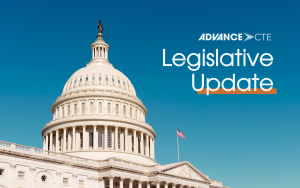This week, the House passed a short-term funding measure to keep the government open through November 21. Elsewhere in Congress, the House Oversight Subcommittee on Economic Growth discussed alternatives to school degrees, and two Senators introduced bipartisan legislation on immersive workforce training. Additionally, the U.S. Department of Education issued updated guidance on Education Flexibility, Secretary Linda McMahon visited Wyoming, and the Department finalized new federal grant priorities.
House Approves Continuing Resolution to Keep Government Open, Awaits Senate Action
Earlier today, the House approved a continuing resolution (CR) to extend current funding levels through November 21. Congress faces a September 30 deadline, as the federal fiscal year 2026 (FY26) begins on October 1. The House has approved this temporary funding extension to get beyond this impending deadline and allow Congressional leaders to work out a longer-term agreement on FY26 funding, including for the Carl D. Perkins Career and Technical Education Act’s (Perkins V) state grant program.
This will leave the Senate little time to act before the September 30 deadline to avert a government shutdown, where the fate of the CR remains uncertain, as it will need additional Democratic votes due to the filibuster rules. Currently, Congressional Democrats have indicated they will vote against the CR until the measure addresses the extension of expiring healthcare tax credits.
Today’s passage of the bill in the House also comes right before next week’s state work period, a brief recess where lawmakers will leave Washington, D.C., and return to their home states and districts. Lawmakers are set to be back in session on Monday, September 29, the day before the funding deadline.
Advance CTE will continue to monitor congressional developments on FY26 funding as it relates to Career Technical Education (CTE) and encourages members to contact their member of Congress concerning the importance of federal investments in CTE, education, and workforce development.
House Oversight Hearing on School Choice
On Wednesday, the House Oversight Subcommittee on Economic Growth held a hearing titled “Opening Doors to Opportunity: The Promise of Expanded School Choice and Alternatives to Four-Year College Degrees.” Throughout the hearing, Republican and Democratic leaders examined school choice, apprenticeships, and other non-degree pathways options available to learners. While lawmakers disagreed on a range of issues, committee members largely agreed that expanding career pathways and CTE program opportunities is essential for America’s future prosperity. Republican Committee members frequently highlighted the need for more flexibility, pointing to apprenticeships as solutions to workforce shortages. Committee Democrats, meanwhile, shared concerns about the impact that diverting public funds from public schools can have on these efforts, particularly concerning options like dual enrollment and CTE. Watch the hearing here.
ED Issues Ed-Flex Guidance
On Wednesday, the U.S. Department of Education’s (ED) Office of Elementary and Secondary Education issued new guidance for state education leaders regarding the Education Flexibility Partnership Act of 1999 (Ed-Flex). The law provides states with Ed-Flex authority, the ability to waive specific federal requirements for districts and schools, without having to go through a formal waiver process with ED. The goal of the updated guidance is to allow state and local education agencies to innovate and tailor education strategies to their needs. This flexibility covers select provisions of the Every Student Succeeds Act (ESSA), specifically Title I, II-A, IV-A, and Perkins V. Read the letter sent to state education leaders here.
Odds & Ends
- Advance CTE was proud to endorse legislation this week, introduced by Senator Lisa Blunt-Rochester (D-DE) and Senator Katie Britt (R-LA). The “Immersive Technology for the American Workforce Act” is a bill that aims to create new federal support for community colleges and area technical centers to make use of virtual or augmented reality technologies for education and training programs. Read the full text of the legislation here.
- ED Secretary Linda McMahon visited Wyoming this week as part of her “Returning Education to the States Tour”, highlighting the state’s efforts to support early literacy, career pathways, and local innovation. Read more about the tour’s progress here.
- Earlier this month, ED finalized three supplemental priorities that take effect October 9 for discretionary grant programs: evidence-based literacy, education choice, and returning education decision-making to the states. Read the priorities on the federal register here. In addition, ED published a new priority related to “Patriotic Education” along with a wider initiative associated with this effort.


